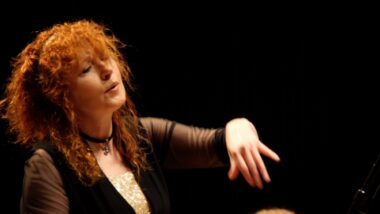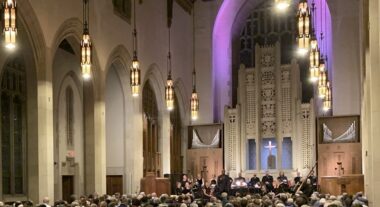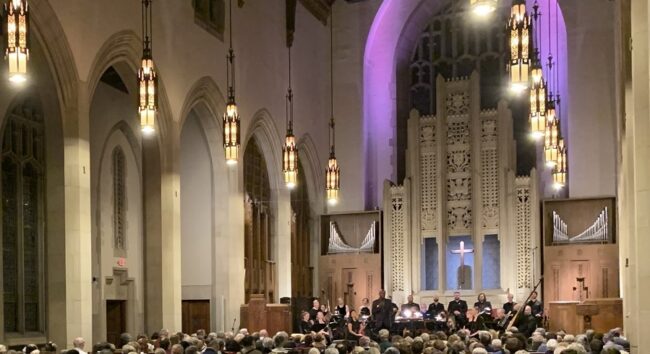 United States Monteverdi, Vespers of 1610: Erica Schuller, Molly Netter, Rebecca Myers (sopranos), Kristen Dubenion-Smith (mezzo-soprano), Jacob Perry, Steven Caldicott Wilson (tenors), Edward Vogel, Andrew Padgett (baritones), Apollo’s Singers, Apollo’s Fire / Jeannette Sorrell (conductor). First Baptist Church, Shaker Heights, Ohio, 8.10.2022. (MSJ)
United States Monteverdi, Vespers of 1610: Erica Schuller, Molly Netter, Rebecca Myers (sopranos), Kristen Dubenion-Smith (mezzo-soprano), Jacob Perry, Steven Caldicott Wilson (tenors), Edward Vogel, Andrew Padgett (baritones), Apollo’s Singers, Apollo’s Fire / Jeannette Sorrell (conductor). First Baptist Church, Shaker Heights, Ohio, 8.10.2022. (MSJ)

There were multi-movement sacred works before Claudio Monteverdi’s epic Vespers, published in 1610, for the whole tradition had gradually emerged over the centuries from medieval mystery plays. But this piece is arguably the one where the fragments of earlier ideas were gathered with the emerging Baroque style to spark something new and powerful. It is the genesis moment that later led to the Bach masses, Handel’s Messiah, Mozart’s Requiem and so many others. It is the Big Bang of western sacred choral music and an essential work.
It has been one that, until this concert, eluded me. Although being of a decidedly secular bent, I have begrudgingly embraced the sacred repertory over the years when it was too undeniably great for me to avoid, but this piece had been a challenge. I had long enjoyed Monteverdi’s earthy secular pieces and had even been swept away by his madrigal Combattimento di Tancredi e Clorinda. I acquired a couple of recordings of the Vespers and listened to them, but the sheer size and scope of the piece (and perhaps the quality of the recordings themselves) left it unfocused to me. I then heard selected excerpts in some earlier Apollo’s Fire live performances which offered partial insights, though I recall one of those concerts being impeded by a venue with inadequate acoustics.

To hear the piece all at once, led by the musician who avows that it is her favorite work, was too great an opportunity to miss. But I wanted to hear it in the right acoustic. Happily, the First Baptist Church of Greater Cleveland is just such a hall. Smaller than a full cathedral but large enough to provide a gentle halo of reverberation, the stone church is comparable to the chapel where the Vespers was likely first presented, during a royal wedding at the court of the Duke of Mantua. This acoustic allowed for the sense of awe sacred music needs, yet remained clear enough and warm enough to do justice to Monteverdi’s fusion of ancient and new, holy and sensual.
Scholars have debated whether the Vespers is a self-contained work or merely a collection of suitable pieces for potential performance as part of a vespers service. Jeannette Sorrell advocates viewing it as a totality, and her presentation of it persuasively supports that notion. While the various psalms and motets were built out of small passages illustrating Biblical texts, they slowly built up into large structures which Sorrell animated into the kind of ebb-and-flow that brings a large work life and shape.
Indeed, for a critic like me who comes from a lifelong immersion in epic late-Romantic orchestral symphonies, it brought to mind the symphonies of nineteenth-century composer Anton Bruckner. He wrote spiritual works of many self-contained paragraphs that only demonstrate a coherent shape once you have heard large chunks of the work and think about the way the blocks fit together. Perhaps Bruckner even got that approach from Monteverdi, for it is known that he studied early music extensively during an age when other composers rarely looked any further back than Bach. Monteverdi’s Vespers works on the same large scale.
Sorrell has long advocated for this work, and her Apollo’s Fire recording (which I made sure to add to my collection at the concert!) was recently named by BBC Classical Music Magazine as one of ‘30 Must-Have Recordings of our Lifetime’. One can see why. In the thirty-plus years that Sorrell has been growing her ensemble, she has made sure that they are masters of a tremendous range of music making, from ethereal spirituality to earthy frolics. That Shakespearean range was brought to bear in the Monteverdi Vespers, ranging from angelic sweetness to human longing, divine power to swaying dance.
The soloists were outstanding, frequently repositioning on stage (and sometimes off) for maximum effect. Jacob Perry engaged compellingly with his arching tenor voice, and the ‘Pulchra Es’ duet between Erica Schuller and Molly Netter was almost unbearably beautiful, the meaning of the text simply but devastatingly conveyed by the singers turning away from each other in the closing measures. That is a good example of how even in a concert presentation, an Apollo’s Fire performance is always alive to the power of communication through stage movement.
Another fine example was in the ‘Audi coelum’ motet, where the vividly energetic and questioning phrases of tenor Steven Caldicott Wilson, front and center on stage, were echoed in the distance by chorister Haitham Haidar, who started somewhere offstage and ended up in the choir loft at the rear of the church. At another point, one of the cornetto (wooden trumpet) players stepped offstage to echo lines played by the onstage performer. The instrumental performers supported the singers throughout with concentration and brilliance.
Monteverdi’s ingenious leavening of the solemn vespers with warmer poetic passages from the Song of Solomon gives the work its comprehensive grasp, and Sorrell and her ensemble showed that they have its measure, revealing Monteverdi as the key figure straddling the shift from the Renaissance to the Baroque, yet making his music, above all, humanly accessible. It was an auspicious beginning to Apollo’s Fire’s thirty-first season.
Mark Sebastian Jordan
